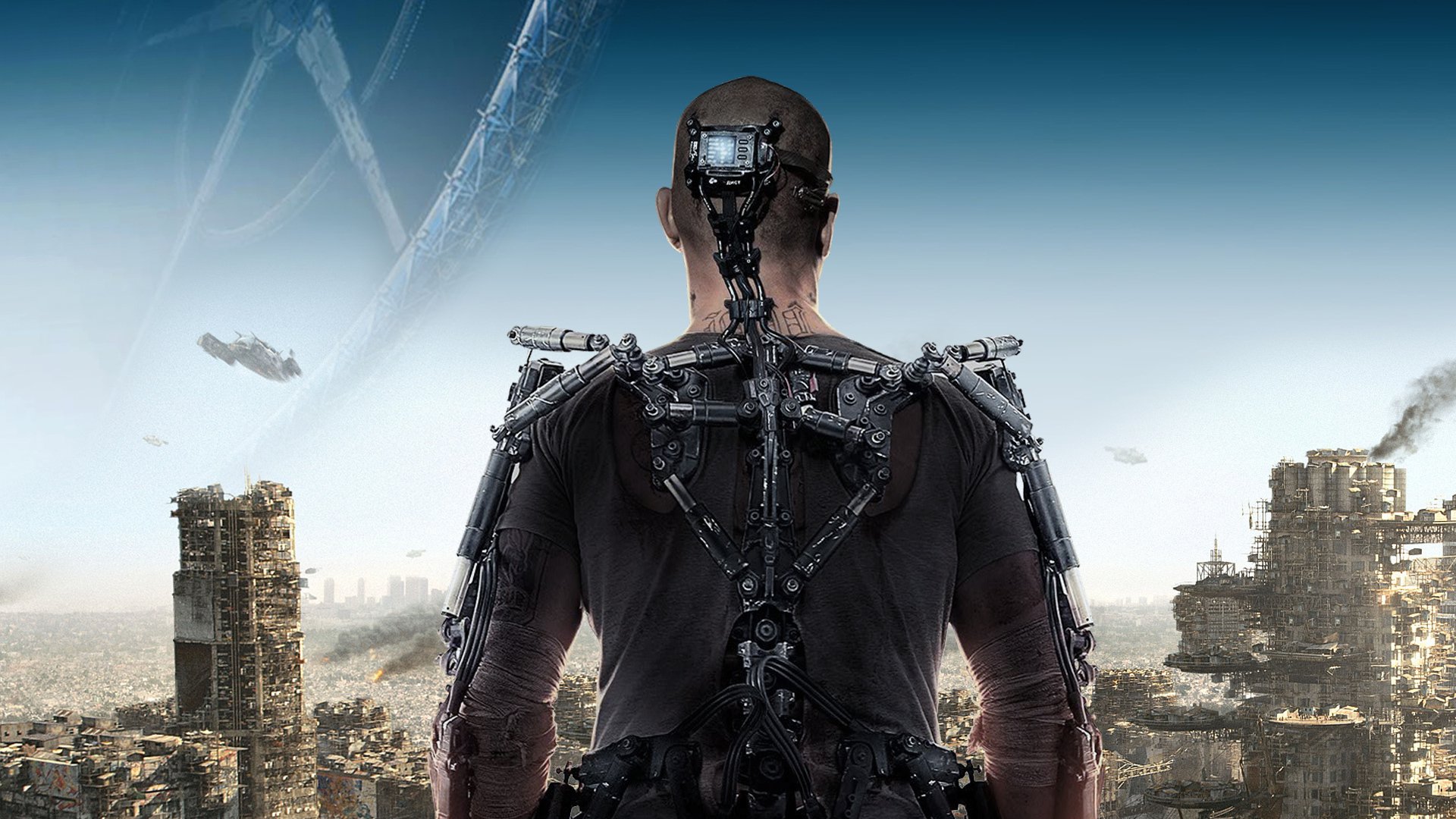The movie Elysium makes a very obvious critique of class systems. The premise of the film—that the wealthy live in luxury in space while the poor suffer on Earth—isn’t subtle about this at all. Quite literally, the two opposed classes live on different worlds, made obvious by the contrast between the clean white palettes of Elysium and the garbage heap that our home world becomes. The difference isn’t just an aesthetic, however. The film goes to great lengths to show us the difference in medical care in both worlds. While on Earth, hospitals don’t have enough staff and resources to keep up with demand, Elysium homes come equipped with med-bays that can heal people pretty much instantly. Truly, I couldn’t tell you if it’s sci fi or magic. Consequently, lots of people try to “illegally” travel to Elysium so they can use these machines to heal themselves or their children. Once there, they’re greeted by all sorts of cruelty in the form of robotic police officers, who apprehend or kill them. (Keep in mind, this movie is from 2013, before Donald Trump and the right turned illegal immigration into the hot-button issue it is today.)
Now, here is where I think the movie fails to live up to its own promise in a pretty major way. The individual in charge of “taking care of” these illegals is one Secretary Delacourt (played by Jodie Foster). For not handling the matter “quietly”, she’s chewed out by her boss, the President of Elysium, and therefore shown as something of a “bad apple” in a system that, I’d argue, likes to imagine itself compassionate in its cruelty, or at least quiet about it. Even Delacourt’s staff appear to be mortified by her decisions, but they don’t say anything. So, she’s portrayed as something of a radical, a lone wolf, in her indifference to anyone whose net worth isn’t up to scratch.
The idea that the system would work well if it weren’t for a “few bad apples” is a pretty common one. You hear it all the time in our political discourse. We talk about how some police, politicians, billionaires, etc. are greedy, corrupt, or otherwise immoral, but we stop there. Dare we take our criticism any further? By only assigning these individual “bad apples” blame for the immoral and grotesque outcomes of a system, we ignore what’s immoral about the system itself. Even at the end, the resolution to the story has everyone becoming a “citizen of Elysium” and opening the borders, but it stops there. Naturally I have no problem with a relative increase in equality, but I’d be curious to know what happened in the days immediately following the movie. Did it really change anything, or would we still have the same exploitative system, just maybe with better healthcare?
Don’t get me wrong, I really enjoyed the movie, but it’s a liberal pipe dream, supposing that we just need a new leader and more inclusion, as they got in the end, who’s going to make everything a bit nicer, without actually changing any of the social relationships that allowed such brutal abuse to occur. I mean, the day following the end of the movie, what do you imagine changed? Like actually changed? Some people will be healthier, sure. But they’ll still live in shit on Earth. They’ll still go to abusive jobs. There’s still an incredible imbalance of wealth and, consequently, power. And I think that says it all really: this isn’t a transformative, progressive bit of media. All that crazy sci fi action, and all that happened is universal healthcare. You know, that thing that all developed countries have except for the United States? Not only does this show the film’s lack of imagination, but also how rooted it is in an American liberal outlook, which is perhaps the most unremarkable, uninteresting political thought I’ve ever encountered.
I might just be uncharitable: the movie did do something interesting by disguising the intentions of the President with the language of human rights, which shows an awareness of how that kind of rhetoric can be more performative than rooted in a respect for human dignity. Nevertheless, it provides a very incomplete critique of class. I’ll say this: I can’t think of a single Elysian citizen who’s portrayed particularly favourably, but it’s safe to say that Delacourt was the moral scapegoat for a President who was just as complicit in the violence and brutality of what can only be described as the lamest, most milquetoast cyberpunk dystopia. (I mean, seriously, did you take a look at those houses on Elysium? Are you allergic to colour or something? Yuck. And not one neon light on Earth! Is it even cyberpunk without neon?) And even the President was only one part of the system itself.
But enough about that. I’m sure you’re wondering why this matters. It’s just a movie, after all, so why get my knickers in a twist? It’s not so much the movie itself (since I quite enjoyed it as a bit of fun) but the politics that presupposes that all we need to do is to widen the tent instead of realizing that the tent was fucked to begin with. And we see this all the time in politics that urge us to “settle” because “it would be worse with the other guys”. How inspiring. (You might recall this breathtaking logic from democratic campaigns over the last ten years.) Of course, it’s always progress needing to settle down, not the system that makes progress necessary in the first place.
Just some food for thought.

Leave a Reply